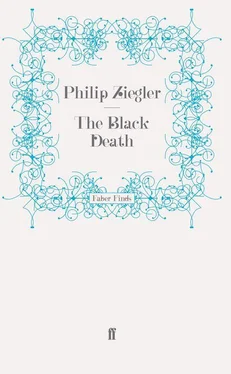Philip Ziegler
THE BLACK DEATH
Second Edition
With a historiography by
Colin Platt
PREFACE TO THE SECOND EDITION
When this history was published in 1969 I remarked in my preface that, though there might be controversy over some of its consequences, all at least would agree that the Black Death was of the greatest economic and social importance as well as hideously dramatic in its progression. I therefore found it surprising that, with the exception of Dr Coulton’s somewhat whimsical monograph of 1929, there had been no general study of the subject since Cardinal Gasquet wrote The Great Pestilence in 1893. In the meantime much new information had come to light and many of the dogmas accepted in the nineteenth century had been disproved or qualified.
I understood then, and perhaps see still more clearly now, the considerations which inhibited the academic historian from embarking on such a labour. Any general study must be either superficial or unwieldy: the first distasteful to the author, the second to the publisher and public. No one, too, can be expert in every aspect of this vast panorama and the spectacle of rival historians, each established in his fortress of specialized knowledge, waiting to destroy the unwary trespasser, is calculated to discourage even the most intrepid.
In Professor Elton’s kindly if contemptuous phrase, I was, and still am, an amateur and came to my task ‘in a happy spirit of untrained enterprise’. I had read massively but laid no claim to the title of medievalist. This, I hope, may excuse me for having rushed in where an angel or even a Professor of Medieval History would fear to tread. (To quote Professor Elton again – the angels may perhaps be forgiven if, rather than tread themselves in those treacherous paths, they prefer to bide their time and tread upon the fools instead.) This book contains virtually no original research. It is an attempt to synthesize in a single readable but reasonably comprehensive volume the records of the contemporary chroniclers and the works of later historians, in particular the great flood of Ph.D. theses and other specialist monographs, each treating some tiny aspect of this enormous subject.
There have been many more such studies since 1969. Colin Pratt, Professor of History at the University of Southampton and himself author of King Death, a vivid portrait of the Black Death and its aftermath in late mediaeval England, has kindly added an annexe summarizing these later contributions. I have made certain changes in my text to reflect the work of these recent researchers. On the whole, however, I feel that the thrust of my narrative is still valid and that its main conclusions are not in question. The most important change of emphasis has been away from the view widely held in the 1960s that the Black Death accelerated and modified existing social and economic trends rather than initiated new ones. Research generally tends to qualify or erode the certainties of earlier historians; it is noteworthy that, in the case of the Black Death, its effect is to express still more emphatically the dramatic results which this catastrophic plague had for the lives of those whom it afflicted.
I went on to suggest that if my book should chance to provoke some academic historian – no doubt incensed by its inadequacy – into engaging in a major work of scholarship, then it would have served a useful purpose. Unsurprisingly perhaps, no such historian has risen to this challenge. This book remains today, as it was in 1969, the only twentieth century study of the Black Death which aspires to cover every significant contribution made by students of the period and yet to provide a narrative that is accessible to the layman.
On the whole the professional medievalists treated my foray into their territory with generosity. Their tendency was to treat me not so much as a candidate for demolition as a useful tool with which to assault offending rivals. ‘Mr Ziegler describes himself as an amateur,’ ran one line of argument. ‘So indeed he is; but compared with Professor X of Y University he seems a real professional…’. Whether their charity would have endured if I had ventured for a second time into their field, I rather doubt. I did not put their forbearance to the test, but prudently retreated to the nineteenth and twentieth century where I feel rather more at home.
One feature of my book which came in for some criticism was the chapter in which I tried to recapture the impact of the plague in an imaginary medieval village. Such frivolity, it was suggested, was out of place in a book which had any pretensions to scholarship. Historical fiction was historical fiction and evermore would be so.
I remain impenitent. Provided an author explains what he is doing and makes no attempt to confuse fiction with fact, surmise with certainty, then I believe he has the right to use any device at his disposal if it will help to make his point more forcibly. In the case of the Black Death, I did not feel that it was possible fully to capture the consequences of the plague on a small, credulous, rural society without inventing a village and examining it under the microscope of the imagination. Statistics and facts alone, however striking, could not convey the horror that afflicted Europe in the mid fourteenth century.
Although I dealt with the Black Death in England more thoroughly than elsewhere, I tried also to give some indication of its origins and to sketch in the outline of its progress across Europe. The result was untidy but to have confined myself to England or the British Isles would have been to sacrifice all perspective in favour of a neat but narrow pattern. To deal with the plague’s progress country by country is in a sense misleading – the Black Death knew no frontiers – but no other division would have made better sense and a seamless flow of narrative would have inconvenienced those who like to lay down a book at the end of a chapter and take it up again without having to remember how far they have got.
There were other problems of construction, too. It would in some ways have been more logical to treat in isolation such subjects as the persecution of the Jews or the state of medical knowledge. On reflection, however, I concluded that the book was little more lucid and considerably easier to read if such topics were dealt with as they seemed naturally to arise in the course of the narrative.
Considering the fearful march of AIDS, particularly in Africa, and the failure of medical science to find a quick solution, one inevitably wonders whether a second Black Death could one day ravage Europe. On the whole it seems unlikely; enough is now known about the workings of disease to ensure that, though doctors and scientists will not always be one step ahead, they will never lag fatally behind. It is more likely that humanity will find other ways to bring about its own destruction. But if another plague, inexplicable, uncheckable, were to sweep across the world, people would not react so very differently. There would be the same mixtures of cowardice and heroism, panic and resignation, selfishness and self-sacrifice. An immeasurable chasm stretches between the fourteenth century and today, but the more that one studies the medieval chronicles, the more convinced one is that human nature remains substantially the same.
Mr Richard Ollard, the late Mr Handasyde Buchanan and my brother, Mr Oliver Ziegler, read my manuscript with fortitude and made many suggestions of great value. Dr Keele of the Wellcome Institute of Medical History was kind enough to read and criticize those sections relating to the nature and history of bubonic plague. Miss Barbara Dodwell, Reader in Medieval History at the University of Reading, corrected many of my blunders and pointed out a variety of ways by which the book might be improved. I have already paid tribute to the signal contribution of Professor Platt.
Читать дальше












